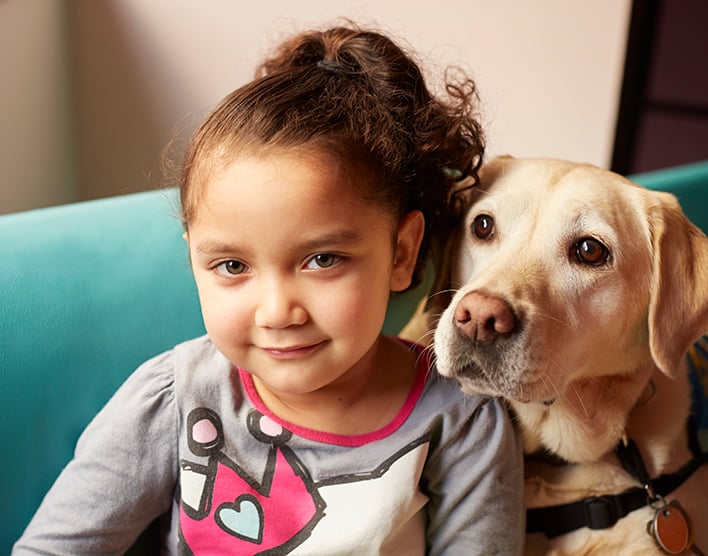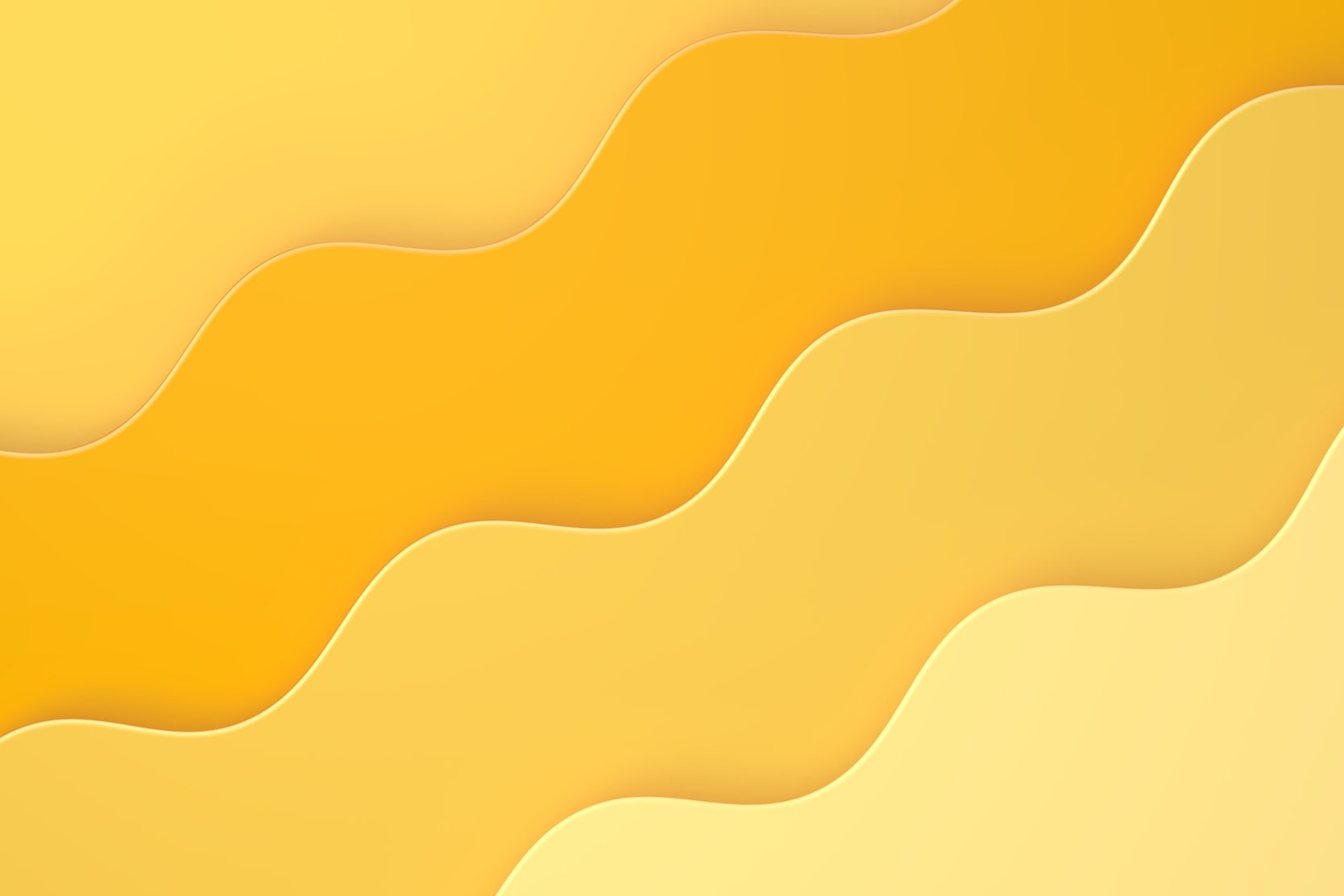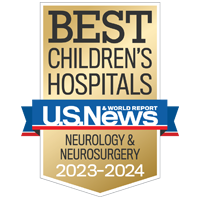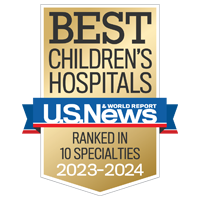Tender wagging care
Our therapy dogs spread joy and smiles at the bedside and throughout the hospital.
Visit Child Life services

Devic's disease, also known as neuromyelitis optica, is a rare neurologic disorder that affects the eyes and spinal cord. It causes optic neuritis, a condition that typically leads to vision loss in one or both eyes, although many patients regain some sight.
Optic neuritis is an inflammation of the optic nerve that connects the eye with the brain. The optic nerve fibers are coated with myelin — fatty tissue that protects nerve cells in the same way that insulation protects electrical wiring in a house. Myelin also helps optic nerve fibers conduct electrical impulses to and from the brain. In most cases, inflammation of the optic nerve is caused by damage to the myelin, called demyelination.
Devic's disease also causes an inflammation of the spinal cord, called myelitis. This typically occurs at the same time as optic neuritis, but can occur before or after.
Over time, the disease may alternate between periods of good health, or remission, and disabling flare-ups, or relapses. The prognosis for children with Devic's disease varies.
At UCSF's Children's Hospital, experts at our Regional Pediatric Multiple Sclerosis Center specialize in the comprehensive care of children and adolescents with Devic's disease and related disorders, such as multiple sclerosis (MS), optic neuritis and acute disseminated encephalomyelitis (ADEM).
The only center of its kind on the West Coast, we are designated by the National Multiple Sclerosis Society as a center of excellence in comprehensive care for pediatric patients with Devic's disease and related disorders. We are dedicated to improving the treatment, diagnosis and awareness of children and adolescents with this condition.
The hallmark symptom of Devic's disease is a sudden loss of vision in both eyes. Other symptoms may include:
An early diagnosis of Devic's disease is critical for the management of this condition and for quality of life.
Your child's doctor will start by conducting a thorough physical examination, asking about any symptoms your child is experiencing, including when they started and how they've eased or progressed over time. Your child's doctor will also record a full medical history, including information about your immediate and extended family's medical history.
In many ways, Devic's disease closely resembles multiple sclerosis (MS) and may be misdiagnosed in the early stages. There are some key differences between the two conditions that a neurologist can recognize. Generally, attacks of Devic's disease tend to be more frequent and severe than in MS. Also, Devic's disease affects only the optic nerves and spinal cord, while MS affects the brain as well.
Your child will have a magnetic resonance imaging (MRI) of the brain to look for lesions or areas of damage that may indicate MS or other disorders. In most cases, children with Devic's disease will have a normal brain MRI, while those with MS will show evidence of damage or lesions. Your child will also have an MRI of the spinal cord. Children with Devic's disease will show significant inflammation of the spinal cord, whereas those with MS will have less severe inflammation. An MRI scan is a non-invasive procedure that uses powerful magnets and radio waves to construct clear, detailed pictures of brain and spinal cord tissues.
Your child may have a recently developed blood test that checks for NMO antibodies, which helps establish a definite diagnosis of Devic's disease.
Your child also will have a lumbar puncture or spinal tap to determine if there are abnormalities in the cerebrospinal fluid (CSF). The CSF is the fluid that bathes, cushions and protects the brain and spinal cord. It flows through the skull and spine in the subarachnoid space, which is the area inside the arachnoid membrane. Typically, in Devic's disease, CSF lacks the elevation of antibodies detected in children with MS.
An eye exam by an ophtalmologist who will look for optic nerve damage may also be recommended. In addition, an evoked potentials test, which records electrical activity in the brain when nerves are stimulated, may also be conducted.
A diagnosis of Devic's disease is based upon an evaluation of your child's symptoms, along with the results of the physical exam and tests.
Our experts will develop a treatment plan, including long-term follow-up care, specifically tailored to your child's needs. When necessary, we collaborate with other specialists at UCSF or elsewhere to ensure that your child receives the most comprehensive care possible.
Treatment will depend on the severity of your child's condition and symptoms.
Intravenous (IV) steroids or oral steroid therapy may be given to your child to manage attacks and control symptoms. Immune suppressant medications, either taken intravenously or orally, may also be recommended to prevent future attacks.
Children who do not respond to steroids or immune suppressant drugs may benefit from plasma exchange. In this procedure, blood is extracted and a machine separates the blood cells from the plasma. Blood cells are then mixed with a replacement solution that resembles plasma, which is then returned to the body.
Because we are part of an international network of six pediatric MS centers sponsored by the National Multiple Sclerosis Society, we have access to the latest information, research and treatments.
UCSF Benioff Children's Hospitals medical specialists have reviewed this information. It is for educational purposes only and is not intended to replace the advice of your child's doctor or other health care provider. We encourage you to discuss any questions or concerns you may have with your child's provider.

One of the nation's best in neurology & neurosurgery

in NIH funding among U.S. neurology programs

Ranked among the nation's best in 10 specialties
Tender wagging care
